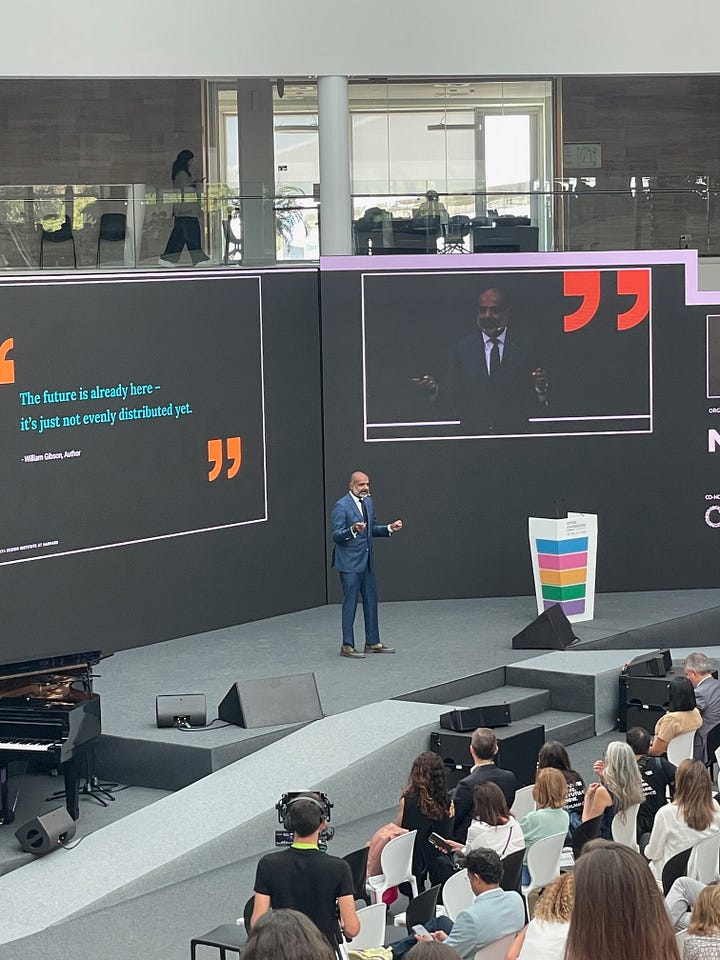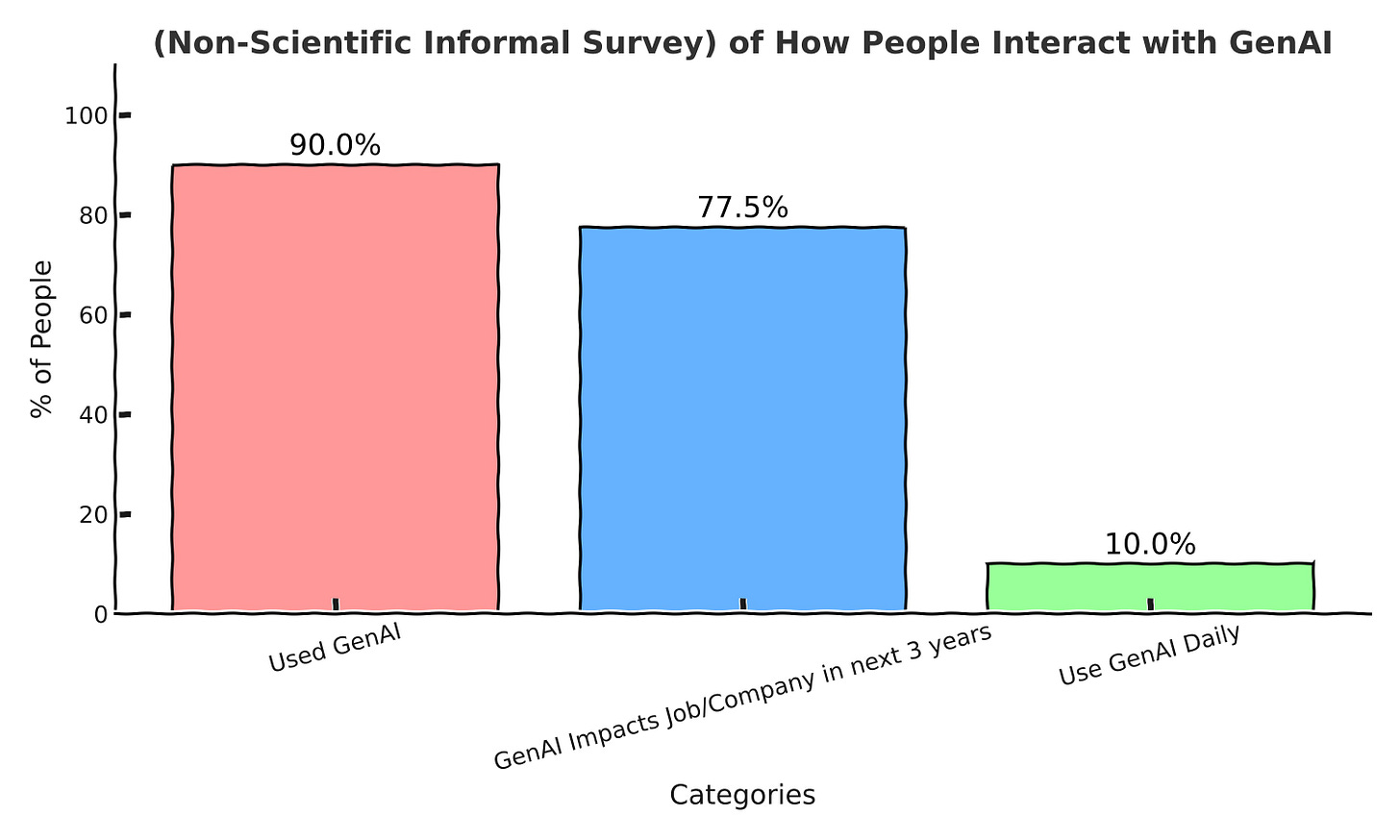Learning to use the bicycle for the mind: Solving the knowing-doing gap with Generative AI
Why do smart people bounce off of Generative AI tools?
The Knowing-Doing Gap
Generative AI systems appear to be both magical and perplexing to most people who encounter them. Social media is full of the next great thing solved by GenAI (e.g. 1,2,3) and many of your work colleagues, your friends and even your kids can’t stop talking about it.
But as soon as you try it, it does not work. It fails miserably. I remember my first time with ChatGPT 3.5 and as any respectable academic would do - my first test case was one of ego surfing and asked (nicely) the bot to create my bio. Of course it stroked my ego with a bio claiming I had won several academic awards, published papers in journals I never had, written cases I never had and coached the Brazilian football team to World Cup glory. Pure fiction, but I'll admit it felt nice for a minute!
In talking to my chum and collaborator Ethan Mollick we both noticed how very smart people would bounce off the ChatGPT after the first and second try. This seemed to be a mistake and I wondered if it was just scholars - who know a lot about very little, were a special case or if this was a common problem. Professor Mitch Weiss, Professor Shikhar Ghosh (both at HBS) and Vladimir Jacimovic (Exec Fellow at HBS and cofounder with me of D^3 Institute) have been on a mission to figure this out and help the people in our close communities get comfortable with GenAI.
So since June, starting at the Spring 2023 HBS Reunions, wherever I have spoken about AI and Business, I start my talk with the following three questions:
How many of you have used Generative AI in the last 6 months
How many of you think that Generative AI will fundamentally change your job, your career, your role and your companies in the next 3 years.
How many of you are using Generative AI tools everyday?
I ask the people to stand up and remain standing as each question is asked if their answer is affirmative. I have now asked these questions in audiences as large as 6000 and as small as 12. They have included large scale conferences, HBS reunions, HBS executive education classes, Harvard university events, company conferences, academic leadership of elite universities and C-suite discussions. Without fail this pattern emerges:
About 90% say they have used Generative AI systems
About 75-80% say they believe that GenAI systems will have significant impact on their careers and companies in the next 3 years!
But, and its a huge but <10% of the people (and I am lucky to hang out with very smart people!) use these tools everyday?
Here are some photos from the Estoril Conference at Nova Business School at the end of August 2023 when I asked these questions:




Here is a non-scientific graph courtesy ChatGPT:
Over the last few months - having spoken a lot to many audiences and seeing this pattern repeat over and over again - I have coined this phenomenon - the Generative AI Knowing-Doing Gap. Lots of people know about it and have tried it and understand the power, they are taken in by all the good reports, but once they try it - it fails and hence they stop.
Being the caustic, acerbic and sarcastic professor that I am, I then tease the audience by saying if they are going to be like my MBA students and just do everything last minute and rushed (like I used to do mysefl as a student!)? Is it going to be a hockey stick learning model? And when will they start? At the 35th month?
Call me crazy, but I think some executives and leaders seem to think "set it and forget it" applies to developing a skill!
The point is that very smart people are bouncing off these tools and that this is creating a serious Knowing-Doing Gap with Generative AI. Just as we have a digital divide - we may soon be encountering an AI divide as well.
Bicycles for the Mind
So why is this so hard? Why are super smart people who seem to know that GenerativeAI is going to have a big impact and soon are not practicing and learning? One potential reason is that acquiring new skill after formal education is actually quite tough. Many of us do not have the practices or the routines to acquire skill.
This has puzzled me for many months until i put two and two together and remembered my chum at Flagship Pioneering Armen Mkrtchyan, mention that LLMs are exactly like what Steve Jobs had said about computers several decades ago - that they are a bicycle for the mind.
His quote from the 1980’s:
“When we invented the personal computer, we created a new kind of bicycle...a new man-machine partnership...a new generation of entrepreneurs.”
For a great breakdown of this quote check out Steven Sinofsky’s meditation on this:
Anyway if GenerativeAI are the new bicycle for the mind then we need to figure out how learn to ride this new bicycle.
Lessons from Learning to Ride a Bike
If memory serves me right - I was late to learning to riding the bike as a youngster. I was growing up in Karachi and our family was not that athletic or interested. But all my friends in the colony where we lived were athletic and one of them, Murad, took on the task to teach me to ride a bike. I fell a countless number of times, I scraped my knees, I had bloody elbows, I had concussions. I was embarrassed - I did not want to do it again.
The moment I clearly remember when I got it was when Murad pushed me off on the bike, I was wobbling and about to fall and he took his slippers (chappals for those from South Asia) and literally wacked me and ran with me as I achieved balance. This is clearly burned in my mind. Murad and the chappals and me achieving balance. Since that I time I have known to ride the bike. And once you learn it you can’t unlearn it. It’s embodied within me and when I am riding, specially with clips on, I feel the bike as a full extension of me.
So what lessons can I generalize from this experience?
Learning a new skill is full of embarrassment - I was embarrassed that I could not ride a bike and that it was visible to my friends
Learning took a while - it was not instant - it required time and practice
Learning was in this case painful - I bruised various parts of my body and also my ego
Learning required instruction - someone who was enough ahead of me so that they could teach me. I did not Murad to be an expert bike instructor - he was just good enough
What do we know about here is one view, here is another, caveat emptor on references though!
Overcoming the Knowing-Doing Gap
So what does it mean for the rest of us? If we truly want to overcome the knowing-doing gap we have to invest in learning and spend the time needed to acquire the skill. This can’t be outsourced, this can’t be delegated. We need to find others who are ahead of us. I have spent countless of hours watching YouTube videos of incredible people giving great lessons.
So who are my go to people for learning:
1 - My collaborator Ethan Mollick - follow him on LinkedIn and his Substack and on the platform formerly known as Twitter
2 - Azeem Azhar and his team have done an amazing job on laying out how they use Generative AI - and soon I will get a chance to hang out with him more! Check out his prompt pack!
3 - Check out this incredible analysis by Mushtaq Bilal on how academics can use GenAI for research framing He has a paid guide as well. I have paid for it and used it and its really good.
4 - Skill Leap AI has great videos that I have learned from.
5 - The AI Advantage has great videos as well.
6 - Our D^3 Institute is incrementally building out content for worldwide consumption - subscribe to our YouTube and LinkedIn.
Let us know about your own learning journey - can you recall a time when you had to learn a something new. What did you takeaway from it? What are the meta lessons you have absorbed that you can share with others?
Finally what are some resources you have found useful to help you in your GenAI learning journey?
If you'd like more insights to help bridge the AI knowing-doing gap, be sure to subscribe to my substack Learn with Professor KL where I'll be sharing my learning journey.


I am reminded of what Alan Kay, inventor of the DynaBook and Object Oriented Programming used to say: any powerful tool takes time to learn: language, mathematics, playing an instrument — all take time to learn. He thinks the idea that you can learn to use a powerful tool without effort is absurd. I agree and one of the reasons so many firms use powerful tools in a commodity fashion is because they believe in the fallacy that easy to use tools are all we should invest in….
Karim, great article.
one analogy that we have found very helpful is swimming (similar to your riding a bike example). Both can't be learned by watching a YouTube video or reading an article, both need an initial guide or teacher (parent or swim coach), both need repeated practice to improve muscle-memory, both are intimidating at for the novice, both have novices who often have STRONG opinions with very little data, both have an initial learning curve for basic competency but also have path for world-class performance (Olympian swimmer or bikecylist), both need the learner to "want" to learn and get the benefits from the pain of learning, both don't have a high cash cost to slow adoption, both need practice, both have varied learning on-ramps that are effective (some people just jump in with a bike and swimming, others needs training class, etc.), both take a while before it becomes second nature but it does, etc.